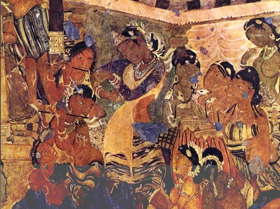Interview: Max Dashu Preserves Women's Dance History

I had the pleasure of meeting Max Dashu at Sacred Woman, Sacred Dance, in the women and trans-run WoW Cafe Theater, back in April 2018. Dashu presented slides of ancient and indigenous rock art, pottery, sculpture, architecture, paintings and photography from around the world and a "round dance", inspired by universal dance customs, which incorporated audience members into a movement ritual. The presentation served as evidence of women's pivotal role in everything from the artistic to the political to the spiritual particularly in egalitarian, matriarchal and matrilineal societies throughout history.
I have long been aware of Dashu's scholarship. Her extensive research fills in the gaps often left in comparative religion, world history and several other major courses of study. Her multicultural understanding of dance history, especially where women are concerned, and its role in the lifeblood of a given culture is a welcome breath of fresh air in the dance field. I was lucky to be able to interview the historian about her experiences.
Dashu: I've always been interested in history and culture and the reality of female oppression was not lost on me growing up. When I hit college, I started asking questions about cultural structures of male domination. I wanted to know if women were free anywhere on the planet. Matrilineal societies were once mentioned by an anthropology professor of mine, who was sure to say that female-centered descent systems didn't mean anything. He claimed that all human societies through history have been male-dominated and men have been the majority of "authorities." I set out to prove him wrong.
BWW: You seem to have an affinity for dance history. Why is that and why is dance in particular important to social change in the modern world?
Dashu: I'm interested in dance because of its transformative-trance-formative-attributes which lead to shifts in consciousness. I'm also interested in its ceremonial power and meanings. Certainly in modern times, dance is one of many arts that can communicate in ways that affect people deeply. It has the capacity to act as a unifying and healing social medium. My friend, Danica Anderson, uses the round dance (Kolo, out of her Serbian heritage) to work with women who have undergone trauma from war and rape. It offers a way out for those caught in frozen pain, a kind of ceremonial alchemy that works on deep levels of psyche and body memory.
BWW: What are your goals for your work?
Dashu: I want to spread awareness of the full range of what it is, has been and can be to live in a female body. We are not lesser, not destined for subordination and violation, even when the surrounding society seems incapable of thinking of us in any other way. I want to show people how systems of domination work and what patterns they have in common. I want to show what women's sovereignty looks like, across the world spectrum of cultures, and to reimagine what history looks like when we foreground women for a change, instead of reducing us to shadows on a stage full of men.
Right now we are fundraising to buy the house where the Suppressed Histories Archives lives, to ensure its preservation and, eventually, to make it a place that people will be able to visit and browse. In the meantime, I am working on pouring out what I've found through the SHA website and Facebook page, through visual webcasts, books, articles, posters and videos. Audio podcasts will be starting up in June 2018.
BWW: What challenges have you faced in your field?
Dashu: I'm a working-class woman without degrees, who left Harvard in 1969, before there was Women's Studies, and climbed back into academia as a guest speaker during the 80s and 90s. Then the rise of postmodern high theory led to a transition of Women's Studies to Gender Studies and my field, women's history, was virtually abandoned. It is as if the portcullis was lowered and the ramps to the ivory tower were pulled up. But I started as a grassroots educator and I've never given that up. So I just continued creating my own sphere as a historian of women on the global scale. Though it was a rough road economically, it gave me the freedom to chart a path outside the doctrinal frameworks of academia, looking at matricultural societies, women's spiritual leadership and philosophies, female iconography in archaeology and Indigenous history.
BWW: Any events, books, etcetera coming up?
Dashu: I'm doing webcasts every month, teaching my online course and taking a hiatus from in-person events for a while so that I can complete my next book, Pythias, Melissae and Pharmakides: Women in Hellenic Culture. Those ancient Greek names refer to female oracles, priestesses and witches. The book should be out later this year. I used to cringe at how Greek and Roman culture was shoved down everybody's throats growing up, but these are the foundations of Western Civilization. Its patriarchal and colonial roots need to be understood in order to deal with our current state of emergency. Underneath that, though, is a deeper story of powerful priestesses, the oracles of Delphi and Dodona and Didyma; and the even older, archaic layers, with their rich depictions of ceremonial culture.
BWW: Thank you! Find out more about Dashu's work at:Suppressed Histories Archives www.suppressedhistories.net
Podcasts / Blog: http://www.sourcememory.net/
FB: https://www.facebook.com/Suppressed-Histories-Archives-333661528320/
Many ceramic paintings show Mediterranean women dancing, green branches in their joined hands, with noticeable North African influences. [see graphic, ©2018 Max Dashu. Authorized for publication with this interview only.]
Comments
Videos

